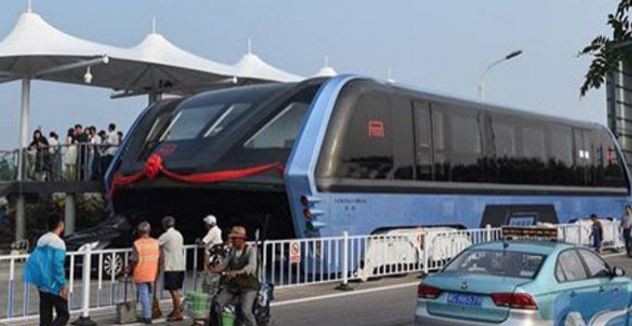Chinese media is awash with news the much-hyped Transit Elevated Bus (TEB) that recently made its first test run in Qinhuangdao City, Hebei Province is really a sophisticated scam designed to rip-off investors big time.
A number of Chinese state media outlets claim the entire TEB project is a scam. They noted the TEB project is being funded by peer-to-peer lending and not by bank loans. In this form of funding, an online company matches potential investors with borrowers, promising high interest rates for investors.
Media noted other peer-to-peer investing platforms in China have proven to be scams. They cited Ezubao, a peer-to-peer lending scheme based in Anhui, that was shut down this year after the government arrested 21 of its officers.
Ezubao was set up as an online scheme in July 2014 and amassed $7.6 billion from 900,000 investors. It stopped trading in December 2015. Zhang Min, the president of the parent company, Yucheng Global, told investigators after his arrest the company operated as a Ponzi scheme.
TEB is a project of Shenzhen Hashi Future Parking Equipment Co., Ltd. while Jinchuang Corporation built the first model of the TEB tested in Qinhuangdao.
The Chinese tabloid Global Times, a propaganda mouthpiece of the Communist Party of China, claims the project's chief architect only has primary school education.
Also lending credence to suspicions the TEB project is a scam is the vehicle itself. Qinhuangdao government officials noted the huge vehicle isn't a bus as is being advertised but is really a train that will need its own special tracks to travel on.
To top it all off, Qinhuangdao officials said they weren't even aware of the test. TEB Technology Development Company's chief engineer later confirmed the test was merely "internal."
"With a carrying capacity of 1,200 people at a time, the TEB has the same functions as the subway while its cost of construction is less than one fifth that of the subway. Its construction can be finished in one year," said Bai Zhiming, engineer in charge of the TEB project.
Qinhuangdao officials also said TEB's specifications don't make sense. Only vehicles that are 2.1 meters tall can pass underneath the TEB but the maximum height of vehicles on the road in China ranges from 4.2 to 4.5 meters, or double the space beneath the TEB. They also don't know how TEB will turn at corners, or if it will obey traffic lights.
Shenzhen Hashi originally said TEB has two levels: passengers travel on the upper half while the lower half has a massive cut-out that allows cars less than two meters tall to travel through it. TEB will bestride two lanes on a road to be specially built for its use. Its maker claims the "bus" will reduce traffic jams by up to 30 percent.
TEB will be powered by electric motors and solar energy and can reach a speed of 60 km/h. It might cost $72 million to build just one bus and the specially-built 40 kilometer-long highway for its use.



























